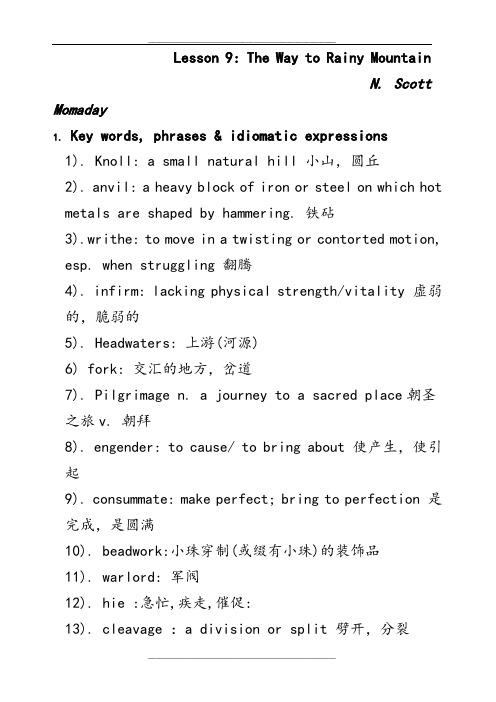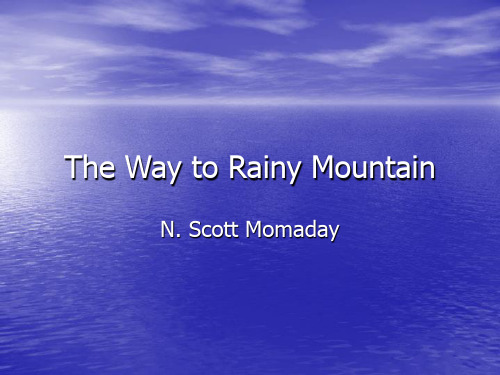Lesson9-单词
- 格式:ppt
- 大小:573.50 KB
- 文档页数:16




Lesson 9: The Way to Rainy MountainN. Scott Momaday1.Key words, phrases & idiomatic expressions1). Knoll: a small natural hill 小山,圆丘2). anvil: a heavy block of iron or steel on which hot metals are shaped by hammering. 铁砧3).writhe: to move in a twisting or contorted motion, esp. when struggling 翻腾4). infirm: lacking physical strength/vitality 虚弱的,脆弱的5). Headwaters: 上游(河源)6) fork: 交汇的地方,岔道7). Pilgrimage n. a journey to a sacred place朝圣之旅v. 朝拜8). engender: to cause/ to bring about 使产生,使引起9). consummate: make perfect; bring to perfection 是完成,是圆满10). beadwork:小珠穿制(或缀有小珠)的装饰品11). warlord: 军阀12). hie :急忙,疾走,催促:13). cleavage :a division or split 劈开,分裂14).deity: the state of being a god;a god or goddess 神,神性15). caldron: a large kettle or boiler大锅,大汽锅16). to wean: to cause to give up a former habit; to withdraw by degrees as by substituting some other interest 使断绝,使放弃17). score: to make cuts or lines in or on 刻线,划线,得分18). impale: to pierce through or fix with a sharp object 刺穿19). skillet:a small frying pan 小煎锅20). ample:large 宽广的,广阔的,(体积长度等)面积大;充足的,富裕的21). wake: a watch or vigil held over the body of a dead person during the night before burial 守夜,守灵22). perch: to alight or rest on 栖息,就位23). purl: to flow with a gentle movement and a murmuring sound 潺潺地流24). preeminently:much more important卓越地(显著地,极度)a single knoll rises out of the plain.一座孤零零的小山拔地而起a matter of disposition: 出于本性, 由于习惯lose the sense of proportion失去(正常的)比例感positively classified明确地归类beyond all comparison:无可比拟,无以伦比a lot of coming and going:人来人往bore themselves upright腰板挺得很直made of lean and leather精瘦2.A one-sentence summary of the textThis excerpt of essay on one hand told readers a story happened to Momaday’s grandmother to reveal the pictorial description of the landscape, and on the other hand discussed the history of Kiowas’forefather and their traditional legacy to express the author’s strong homesickness and pride, in order to remind people that one should always remember his blood and root so that he can live with loyalty and without the feeling of being at sea. 3.Outline of the paragraphsPart One(Para1):An outline of the author’s ancestral land.Part Two(Para 2,3)::Introduction of Rainy Mountain, on which his grandmother’s grave lie and summary of the history of Kiowas..Part Three(Para4-10):Exploration fo the three stages of the Kiowas’ culture—emergence, evolution and decline; Reasons to going back to Rainy Moutain and brief descriptions fo the author’s grandma.His grandmother serves as a focus or a link by which the author moves his narrative from one stage to another.Part Five(para11,12):Memorys of his life together with his grandma.Part Six(para13-15):The author feeling changed on ancestral culture and compliment the active influence of the cultural heritage of Rainy Mountain.4.Parts of the text you find difficult to understand The author’s feeling at the end of the article.5.One meaningful question you especially want to raise about the textWhat is the link between the authour’s ancestral culture and his narrator life?。


Lesson 9 Royal espionage第九课王室谍报活动by BERNARD NEWMANfrom Spies in Britain9-1. Alfred the Great acted as his own spy, visiting Danish camps disguised as a minstrel.【译文】阿尔弗雷德大帝曾亲自充当间谍。
他乔装吟游歌手进入丹麦军队营地侦察。
【讲解】Alfred the Great,阿尔弗雷德大帝,古英国国王,22岁登基,为抵抗入侵的丹麦人,先后与丹麦军交战6年未能取胜,后潜匿于阿森尔尼岛,终于打败丹麦军。
visiting Danish camps disguised as a minstrel作方式状语,修饰acted。
disguised as a minstrel作方式状语,修饰visiting。
【单词和短语】disguise:假扮,化装(to change someone’s appearance so that people cannot recognize them),例如:She disguised herself as a man with a false beard.她戴上假须女扮男装。
9-2. In those days wandering minstrels were welcome everywhere.【译文】当时,浪迹四方的吟游歌手到处受欢迎。
【讲解】wandering minstrels,浪迹四方的吟游歌手。
中世纪时期,欧洲云游四方的歌手一般都身带竖琴,自弹自唱,传颂古代的历史传说。
【单词和短语】wandering:漫游的;闲逛的;流浪的(one uses wandering to describe a person who moves from place to place and has no permanent home)。
Lesson 9 How are you today?今天好么?New Word and expressions生词和短语hello[he'ləu] int.喂(表示问候)hi[hai] int. 喂,嗨how[hau] adv. 怎样today[tə'dei] adv. 今天well[wel] adj. 身体好fine[fain] adj. 美好的thanks[θæŋks] int. 谢谢goodbye[,ɡud'bai] int. 再见see[si:] v. 见hello[hə'ləu] int.喂(表示问候)int.=interjection [,intə'dʒekʃən] 感叹词接电话:Hello,this is。
HelloKitty ╮(╯3╰)╭hi[hai] int.喂,嗨他们等同,一般的打招呼用语。
认识的朋友之间,比较随意的。
how[hau] adv.怎样how是特殊疑问词,用来引导特殊疑问句,还有诸类的特殊疑问词,比如说:what,where,when,why,who,whose……how many + 可数名词的复数形式How many students? 多少学生?How many girls? 有多少个女孩子?How many coats? 有多少件大衣?How much + 不可数名词形式(价格)How much tea ? 有多少茶水?(茶叶在英语中不可数)How much water? 有多少水?How much is the handbag?这个手提包多少钱?How much is it ? 多少钱?How long… 多长时间How long have you been in China ? 你来中国多长时间了?How often … 多久,多常(表频率)How often do you watch TV? 你多久看一次电视?How often do you take a bath? 你多久洗一次澡?How far … 多远……How far is it from here?从这到那多远啊?How soon … 多久……-I am leaving for Shanghai on business.我要去上海出差。